Descartes's Method by Tarek R. Dika

Author:Tarek R. Dika [Dika, Tarek R.]
Language: eng
Format: epub
ISBN: 9780192696946
Publisher: OUP Oxford
Published: 2023-02-15T00:00:00+00:00
7.3 The Intellectual Simple Natures and the Use of the Pure Intellect
According to Descartesâs habitual theory of the faculties, the intellectual simple natures cannot be intuited unless the pure intellect intuits them entirely on its own, without relying on the imagination and the senses: â[When] the intellect is concerned with matters in which there is nothing corporeal or similar to the corporeal, it cannot receive any helpâ from these two faculties (AT 10:416, CSM 1:43). The intellect cannot understand incorporeal things by turning toward images in the imagination. It is the impossibility of forming any corporeal idea of knowledge, doubt, ignorance, and volition, together with the fact these notions cannot be further divided into yet other, more distinct notions (cognitive indivisibility), that places them squarely in the subclass of intellectual simple natures:
Those simple natures which the intellect recognizes by means of a sort of innate light, without the aid of any corporeal image, are purely intellectual. That there is a number of such things is certain: it is impossible to form any corporeal idea which represents for us [idea corporea quae nobis repraesentet] what knowledge or doubt or ignorance is, or the action of the will, which may be called âvolition,â and the like; and yet we have real knowledge of all of these, knowledge so easy that in order to possess it all we need is some degree of rationality (AT 10:419, CSM 1:44â45).
Each one of these acts can be directly exhibited in intuition simply by performing the relevant act: â[I]n order to know what doubt and thought are, all one need do is to doubt or to think. That tells us all it is possible to know about them, and explains more about them than even the most precise definitionsâ (Search after Truth, AT 10:524, CSM 2:418). To doubt, know that one doubts, and know what doubt is are one and the same; one cannot know that one doubts without knowing what doubt is.9 The class of intellectual simple natures includes at least as many members as there are operations of the pure intellect (and in general any object whose intuition depends on the intellect alone). As acts of vis cognoscens, they are one and all its modes (Descartes would later refer to them as modes of thought). Descartesâs enumeration3 of the intellectual simple natures is not complete, but rather sufficient; any act of the pure intellect can be included in the class of intellectual simple natures. There is no need to enumerate3 them all. The âet similiaâ and âetc.â appended to the end of his enumerations3 should be read an open invitation to extend the class as needed.10
Download
This site does not store any files on its server. We only index and link to content provided by other sites. Please contact the content providers to delete copyright contents if any and email us, we'll remove relevant links or contents immediately.
| Deconstruction | Existentialism |
| Humanism | Phenomenology |
| Pragmatism | Rationalism |
| Structuralism | Transcendentalism |
| Utilitarianism |
The remains of the day by Kazuo Ishiguro(9000)
Tools of Titans by Timothy Ferriss(8398)
Giovanni's Room by James Baldwin(7347)
The Black Swan by Nassim Nicholas Taleb(7132)
Inner Engineering: A Yogi's Guide to Joy by Sadhguru(6797)
The Way of Zen by Alan W. Watts(6615)
The Power of Now: A Guide to Spiritual Enlightenment by Eckhart Tolle(5785)
Asking the Right Questions: A Guide to Critical Thinking by M. Neil Browne & Stuart M. Keeley(5776)
The Six Wives Of Henry VIII (WOMEN IN HISTORY) by Fraser Antonia(5516)
Astrophysics for People in a Hurry by Neil DeGrasse Tyson(5191)
Housekeeping by Marilynne Robinson(4449)
12 Rules for Life by Jordan B. Peterson(4307)
Ikigai by Héctor García & Francesc Miralles(4275)
Double Down (Diary of a Wimpy Kid Book 11) by Jeff Kinney(4273)
The Ethical Slut by Janet W. Hardy(4258)
Skin in the Game by Nassim Nicholas Taleb(4250)
The Art of Happiness by The Dalai Lama(4130)
Skin in the Game: Hidden Asymmetries in Daily Life by Nassim Nicholas Taleb(4007)
Walking by Henry David Thoreau(3963)
